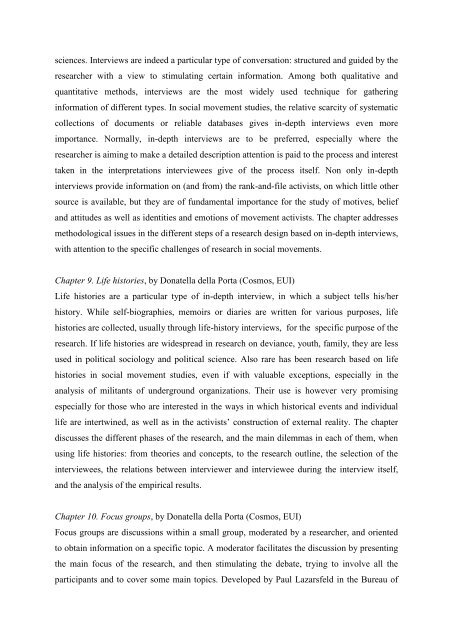Methodological Practices in Social Movements Research
Methodological Practices in Social Movements Research
Methodological Practices in Social Movements Research
Create successful ePaper yourself
Turn your PDF publications into a flip-book with our unique Google optimized e-Paper software.
sciences. Interviews are <strong>in</strong>deed a particular type of conversation: structured and guided by the<br />
researcher with a view to stimulat<strong>in</strong>g certa<strong>in</strong> <strong>in</strong>formation. Among both qualitative and<br />
quantitative methods, <strong>in</strong>terviews are the most widely used technique for gather<strong>in</strong>g<br />
<strong>in</strong>formation of different types. In social movement studies, the relative scarcity of systematic<br />
collections of documents or reliable databases gives <strong>in</strong>-depth <strong>in</strong>terviews even more<br />
importance. Normally, <strong>in</strong>-depth <strong>in</strong>terviews are to be preferred, especially where the<br />
researcher is aim<strong>in</strong>g to make a detailed description attention is paid to the process and <strong>in</strong>terest<br />
taken <strong>in</strong> the <strong>in</strong>terpretations <strong>in</strong>terviewees give of the process itself. Non only <strong>in</strong>-depth<br />
<strong>in</strong>terviews provide <strong>in</strong>formation on (and from) the rank-and-file activists, on which little other<br />
source is available, but they are of fundamental importance for the study of motives, belief<br />
and attitudes as well as identities and emotions of movement activists. The chapter addresses<br />
methodological issues <strong>in</strong> the different steps of a research design based on <strong>in</strong>-depth <strong>in</strong>terviews,<br />
with attention to the specific challenges of research <strong>in</strong> social movements.<br />
Chapter 9. Life histories, by Donatella della Porta (Cosmos, EUI)<br />
Life histories are a particular type of <strong>in</strong>-depth <strong>in</strong>terview, <strong>in</strong> which a subject tells his/her<br />
history. While self-biographies, memoirs or diaries are written for various purposes, life<br />
histories are collected, usually through life-history <strong>in</strong>terviews, for the specific purpose of the<br />
research. If life histories are widespread <strong>in</strong> research on deviance, youth, family, they are less<br />
used <strong>in</strong> political sociology and political science. Also rare has been research based on life<br />
histories <strong>in</strong> social movement studies, even if with valuable exceptions, especially <strong>in</strong> the<br />
analysis of militants of underground organizations. Their use is however very promis<strong>in</strong>g<br />
especially for those who are <strong>in</strong>terested <strong>in</strong> the ways <strong>in</strong> which historical events and <strong>in</strong>dividual<br />
life are <strong>in</strong>tertw<strong>in</strong>ed, as well as <strong>in</strong> the activists’ construction of external reality. The chapter<br />
discusses the different phases of the research, and the ma<strong>in</strong> dilemmas <strong>in</strong> each of them, when<br />
us<strong>in</strong>g life histories: from theories and concepts, to the research outl<strong>in</strong>e, the selection of the<br />
<strong>in</strong>terviewees, the relations between <strong>in</strong>terviewer and <strong>in</strong>terviewee dur<strong>in</strong>g the <strong>in</strong>terview itself,<br />
and the analysis of the empirical results.<br />
Chapter 10. Focus groups, by Donatella della Porta (Cosmos, EUI)<br />
Focus groups are discussions with<strong>in</strong> a small group, moderated by a researcher, and oriented<br />
to obta<strong>in</strong> <strong>in</strong>formation on a specific topic. A moderator facilitates the discussion by present<strong>in</strong>g<br />
the ma<strong>in</strong> focus of the research, and then stimulat<strong>in</strong>g the debate, try<strong>in</strong>g to <strong>in</strong>volve all the<br />
participants and to cover some ma<strong>in</strong> topics. Developed by Paul Lazarsfeld <strong>in</strong> the Bureau of

















